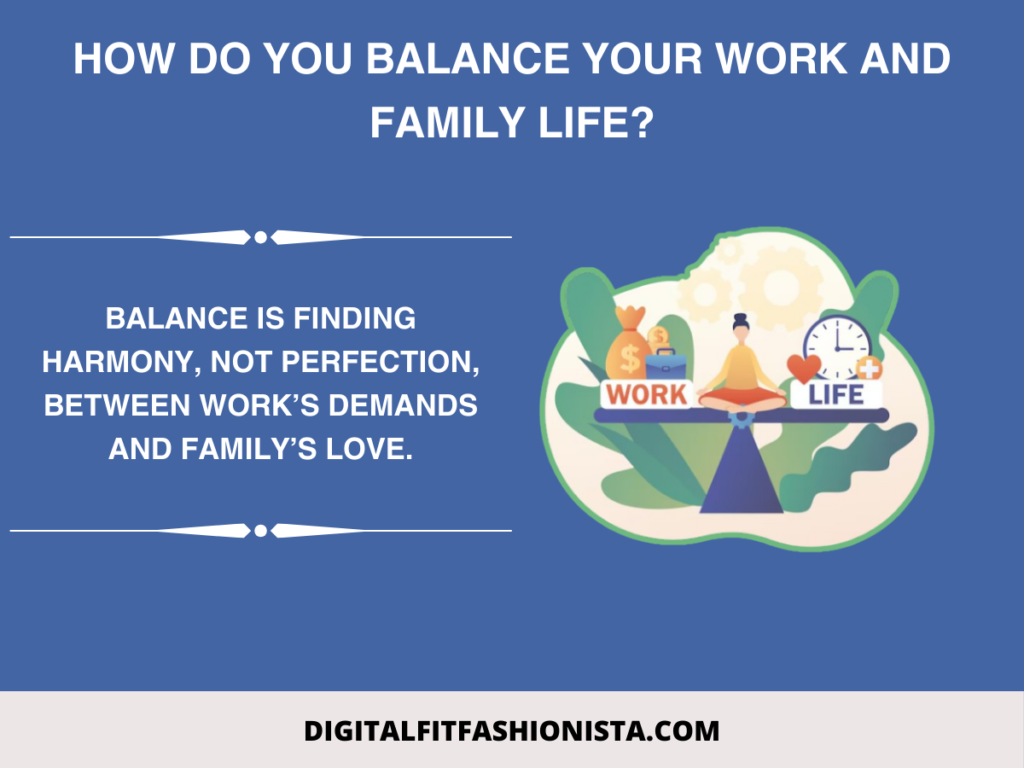Striking the right balance between work and family is key to living a fulfilling life, both personally and professionally.
As responsibilities increase in both areas, managing time wisely and knowing when to shift focus from work to family, or vice versa, becomes crucial.
How do you balance work and family life? Achieving this balance enhances productivity at work and improves relationships with loved ones. It also reduces stress, better mental health, and overall satisfaction.
Below are practical tips to help you successfully manage your work-life balance.
How do you balance your work and family life?

Balancing work and family life requires thoughtful planning, clear boundaries, and self-care.
You can maintain harmony and reduce stress by prioritizing both professional and personal commitments. It’s important to recognize when to focus on work and when to give time to loved ones.
Implementing effective time management strategies can lead to a fulfilling and balanced lifestyle. Let’s look into the following article to get clear knowledge.
1. Limit Non-Essential Activities
In today’s world, distractions are everywhere. From constantly checking social media to watching endless TV shows, many activities eat up valuable time that could be spent on more productive tasks.
To manage your time effectively, take a step back and evaluate which activities are unnecessary and consume your time without providing any real value.
For example, setting specific times for checking emails or limiting screen time in the evening can free up space for both work and personal commitments.
This will help you focus better on both work and family, ensuring you’re fully present in every moment.
2. Learn to Say “No”
It’s common to want to please others, especially your boss or coworkers, but learning to say “no” is an essential skill for maintaining balance. Overcommitting yourself can lead to stress and burnout.
For instance, if you’re already overloaded with work, taking on additional tasks can stretch you too thin, affecting both your productivity at work and your quality time with family.
Saying no when necessary doesn’t mean you are unwilling or uncooperative; it’s about protecting your well-being.
Politely explain your situation, and prioritize tasks based on urgency and importance.
3. Set Boundaries and Unplug

With modern technology, work can easily extend beyond regular office hours. Checking emails, answering work calls, or completing tasks outside of work hours can quickly blur the lines between your personal and professional life.
Establish boundaries to maintain a healthy work-life balance. Set specific hours during which you are available for work, and then unplug.
For example, you could decide not to check your work email after dinner, allowing yourself to be fully present with your family. This approach ensures that work doesn’t invade your time and for that, you get the mental space you need to recharge.
4. Organize Your Schedule
A well-organized schedule is a powerful tool for balancing work and family. A calendar or scheduling app allows you to mark work-related tasks and personal commitments.
This helps you allocate specific times for work, family activities, and self-care.
For instance, scheduling family dinners or weekend activities ensures you don’t neglect these important moments.
Having a structured routine allows you to stay on top of your work without missing out on quality time with loved ones.
5. Communicate Your Needs Clearly

Honest communication with your manager is essential when it comes to achieving work-life balance.
If you’re struggling to balance your work and personal life, it’s important to talk to your supervisor about it.
For example, if your workload is overwhelming, or you need to adjust your working hours to attend family events, explain your situation clearly.
By discussing your needs, you create an opportunity for your employer to help adjust your schedule or workload, which ultimately benefits both your career and personal life.
6. Identify Your Core Values
Understanding what truly matters to you—whether it’s family, health, career success, or personal happiness—can help you make better decisions and prioritize your time accordingly.
For example, if you value spending time with family, you might choose to decline work that requires evening hours or weekend shifts.
Regularly reassessing your core values ensures that your actions align with your long-term goals, making it easier to strike the right balance between work and personal life.
7. Explore Flexible Work Options
In today’s world, many companies offer flexible work arrangements to support employees in balancing work and family.
These options may include working from home, flexible hours, or compressed workweeks.
By exploring these possibilities, you can adjust your work schedule to better fit your family’s needs.
For example, if you have young children, working from home a few days a week can eliminate the time spent commuting and allow you to be more present at home.
Flexibility at work can significantly ease the tension between professional and personal commitments.
8. Accept Setbacks and Be Flexible
Life rarely goes as planned, and achieving perfect balance is not always possible. Sometimes work demands more attention, or a family emergency may require you to adjust your priorities.
It’s important to accept that setbacks will happen and not let them derail your efforts to maintain balance.
For instance, during busy work periods, you might have to sacrifice some personal time to meet deadlines.
However, once the busy phase is over, make a conscious effort to return to your balanced routine, ensuring you don’t neglect family or self-care for too long.
9. Make Time for Hobbies

Pursuing hobbies is a great way to reduce stress and improve your mental health. Whether it’s painting, cooking, gardening, or playing a musical instrument, spending time doing something you enjoy can provide a sense of relaxation and fulfilment.
For example, dedicating just 15-30 minutes a day to reading or another hobby can refresh your mind and boost your mood.
Having this personal time allows you to unwind and return to work and family life feeling energized and focused.
10. Adopt Healthy Habits
Maintaining physical and mental health is essential when balancing work and family. Regular exercise, healthy eating, and adequate sleep can reduce stress and improve overall well-being.
For instance, going for a walk during lunch or practising yoga in the evening can help reduce tension and refresh your mind.
Eating well-balanced meals and getting enough sleep also boosts energy levels, making it easier to stay productive at work and present for family activities.
By prioritizing your health, you can better handle the demands of both work and home life.
11. Practice Stress Relief Techniques
Managing stress is an ongoing challenge, especially when juggling work and family responsibilities. Incorporating relaxation techniques into your daily routine,
such as deep breathing exercises, meditation, or journaling, can help you stay calm and focused.
For example, practising mindfulness for just 10 minutes a day can help clear your mind and reduce anxiety.
Regular physical activity, like a daily jog or attending a yoga class, can also serve as an excellent stress reliever.
By committing to stress management, you can maintain a sense of peace and balance, even during challenging times.
Benefits of Balancing Work and Family Life
Balancing work and family life offers numerous advantages that can enhance your overall well-being and satisfaction.
The key benefits of achieving a healthy balance between work and personal life include reduced stress, improved mental health, stronger relationships, and increased productivity.
Below, we break down the main benefits of maintaining a good work-life balance:
1. Reduced Stress and Burnout
One of the most significant benefits of balancing work and family life is stress reduction.
When you maintain a healthy equilibrium, you are less likely to feel overwhelmed by competing demands.
By managing your time effectively and setting boundaries between work and home life, you can prevent burnout.
For example, having designated time for relaxation and family activities helps your mind recharge, making you feel less anxious and more energized for both work and personal commitments.
2. Improved Mental Health
Maintaining a balance between work and family is essential for mental well-being. Consistently focusing on one area—whether work or family—without proper time for the other can cause emotional exhaustion and strain.
A balanced life gives you space to rest, enjoy hobbies, and spend quality time with loved ones.
These moments of relaxation and connection contribute to better mental health, reducing the risk of anxiety and depression.
For instance, spending quality time with your children or engaging in a favourite hobby can significantly improve your mood and overall outlook on life.
3. Enhanced Productivity at Work
When you balance work and family life, you create a clear distinction between the two, allowing you to fully focus on each area when needed.
This separation leads to better efficiency and productivity at work.
For example, taking breaks to unwind or enjoying time with family can help you return to work feeling refreshed and ready to tackle tasks with renewed energy.
Moreover, reducing distractions outside of work hours ensures that you can dedicate your full attention to your professional responsibilities during the workday.
4. Stronger Relationships with Family
A balanced life means you have more time to nurture relationships with your family members.
Prioritizing family time fosters deeper emotional connections and builds a supportive network at home.
Regular family activities—such as weekend outings or dinners—help you stay emotionally connected with loved ones.
For example, setting aside specific times for family activities allows you to be mentally present, improving communication and reducing potential conflicts.
These stronger relationships also provide emotional support when work-related stress arises, creating a positive feedback loop between your professional and personal lives.
5. Increased Job Satisfaction
When you have a healthy work-life balance, you are more likely to feel satisfied with your job.
You can meet both professional goals and personal needs, which leads to a greater sense of accomplishment.
For instance, knowing that you have time to enjoy activities outside of work can increase your motivation at work, as you no longer feel like your career is consuming all of your time.
Furthermore, a balanced lifestyle can help you avoid the negative effects of overworking, such as decreased productivity and a sense of dissatisfaction.
6. Better Physical Health
Maintaining a healthy lifestyle is often a byproduct of balancing work and family life. When you prioritize both work and personal time, you also create space for physical activities, rest, and proper nutrition.
For example, you can incorporate exercise into your daily routine, whether through a morning workout or family walks.
Taking care of your health by getting adequate sleep and eating balanced meals also helps you maintain the energy levels needed to perform well at work and enjoy time with your family.
In turn, good physical health helps you better manage stress and stay productive in all areas of life.
7. Increased Personal Satisfaction and Happiness
Perhaps the most rewarding benefit of balancing work and family life is the sense of personal satisfaction and happiness it brings.
When you’re able to meet your work goals while still enjoying fulfilling relationships with your family, you experience a greater sense of fulfilment.
For example, spending time with your children or spouse after a successful project at work brings joy and pride in both areas of life.
This increased satisfaction improves your overall quality of life, ensuring that both work and personal moments are enjoyable and meaningful.
Effects of Poor Work-Life Balance
If you fail to balance work and family, the effects can be damaging. Stress, fatigue, poor health, and emotional distance from loved ones can all result from overworking.
For example, constant work pressure can lead to burnout, making you feel emotionally drained and distant from your family.
Additionally, lack of family time can strain relationships and cause feelings of guilt or regret. It’s crucial to recognize the signs of imbalance early and take action before it negatively impacts your well-being.
Conclusion
Achieving a work-life balance is a journey, not a destination. By following the tips mentioned above—setting boundaries, managing time, communicating effectively, and prioritizing your health—you can maintain harmony between your professional and personal lives.
Remember, balance looks different for everyone, and what works for one person may not work for another.
The key is to stay flexible, be patient, and continuously reassess your priorities. With the right mindset and a proactive approach, you can successfully manage your career and family life, leading to a more fulfilling and stress-free lifestyle.
FAQs
How to balance work and family as a woman?
Balancing work and family as a woman can be challenging, but with careful planning and effective time management, it’s entirely possible. One key approach is prioritizing and setting clear boundaries between work and home life. Create a schedule that includes time for work, family, and personal care, and communicate openly with both employers and family members about your availability.
Why is it important to balance work and family?
Balancing work and family is important because it allows individuals to thrive both professionally and personally, leading to improved mental and physical well-being. Achieving this balance reduces stress, enhances job satisfaction, and strengthens family relationships. It can also prevent burnout by ensuring that time is made for rest, recreation, and personal care. Striking a balance helps individuals feel more fulfilled and motivated in both their careers and home lives, ultimately contributing to a more harmonious lifestyle.
How can I improve my work-life balance?
Improving your work-life balance begins with self-awareness and proactive scheduling. Set clear boundaries by creating a specific work schedule and designated personal time. Prioritize essential tasks and learn to delegate or say no to tasks that don’t align with your core priorities. Make time for self-care, such as exercise or relaxation, and ensure you have uninterrupted family time. Regularly assess your balance and adjust as needed, considering any new changes in work or personal life.
What are the challenges of balancing work and family?
Some common challenges of balancing work and family include time constraints, job pressures, and lack of flexibility in work schedules. Many individuals struggle with finding enough time for personal and family activities while meeting work demands. Other challenges include guilt when focusing on one area over another and the emotional toll of constantly switching between different roles. To address these challenges, it’s crucial to establish boundaries, prioritize tasks, and seek support when needed.
What role does flexibility play in work-life balance?
Flexibility plays a crucial role in achieving a successful work-life balance. When employers offer flexible work hours, remote work options, or job-sharing opportunities, it allows employees to manage both professional and personal responsibilities more effectively. Flexibility gives individuals the ability to adjust their schedules to meet family needs, such as attending events or caring for children, while still fulfilling work obligations. This results in less stress, higher productivity, and greater overall satisfaction.
- Is it possible to reverse skin ageing? - August 21, 2025
- How to regain motivation during burnout? - August 12, 2025
- What is a digital detox day? - July 31, 2025


